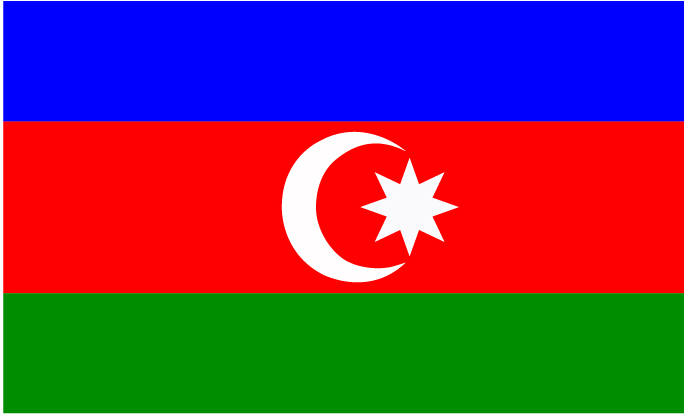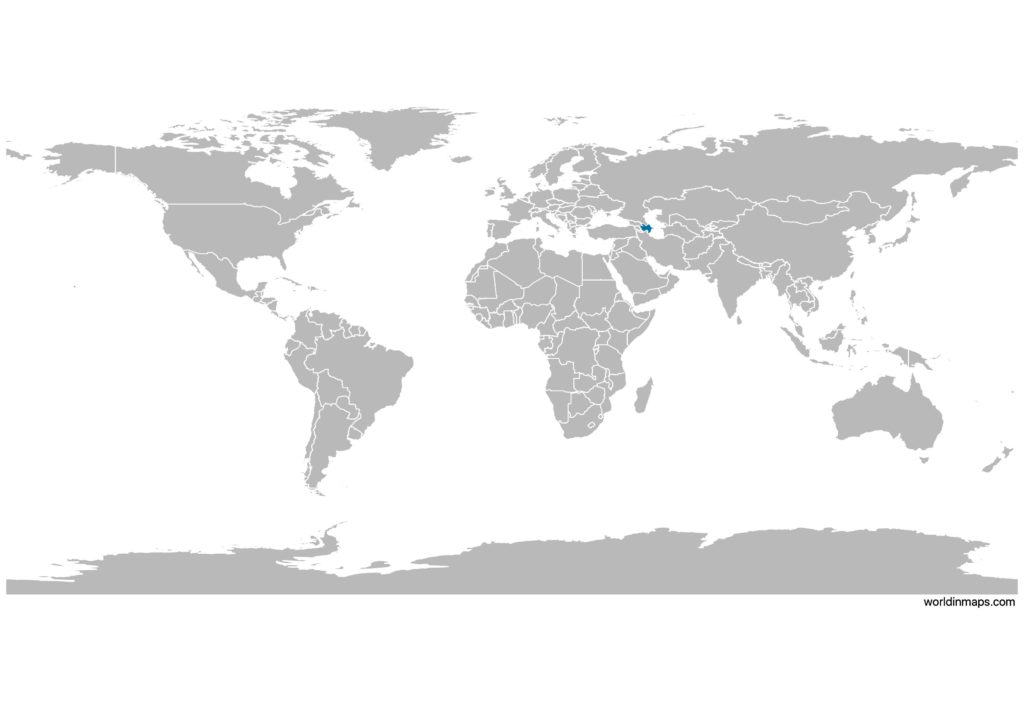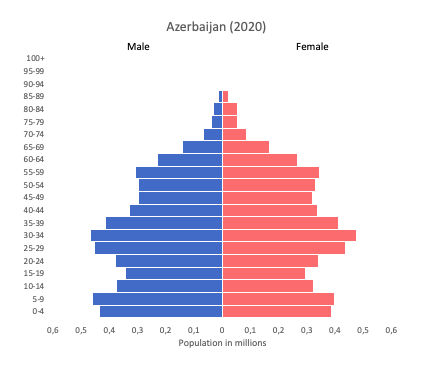Azerbaijan

| Government | |
| Name | Republic of Azerbaijan |
| Azerbaijani | Azərbaycan Respublikası |
| Government type | Presidential republic |
| Capital | Baku (2,150,800 (2013)) |
| Currency | Manat (AZN) |
| Organization | |
| Member State | Commonwealth of Independent States (CIS) |
| People | |
| Population (2020) | 10,139,175 (91st) |
| Density of population | 115 P/km2 (99th) |
| Nationality | Azerbaijani |
| Official languages | |
| Azerbaijani | |
| Ethnic groups (2009) | |
| Azerbaijani | 91.6% |
| Lezghin | 2% |
| Russian | 1.3% |
| Armenian | 1.3% |
| Talysh | 1.3% |
| Other | 2.4% |
| Religion (2010) | |
| Muslim (predominantly Shia) | 96.9% |
| Christian | 3% |
| Other | <0.1% |
| Unaffiliated | <0.1% |
| Life expectancy (2020) | |
| Male | 70.5 years |
| Female | 76.9 years |
| Total population | 73.6 years (144th) |
| Homicides | |
| Total (2018) | 2.2 per 100,000 people (103rd) |
| Geography | |
| Land area | 82,629 km2 |
| water area | 3,971 km2 |
| total area | 86,600 km2 (114th) |
| Mean elevation | 384 m |
| Lowest point | |
| Caspian Sea | -28 m |
| Highest point | |
| Bazarduzu | 4,466 m |
| Land use (2016) | |
| Agricultural land | 57.6% |
| Arable land | 22.8% |
| Permanent crops | 2.7% |
| Permanent pasture | 32.1% |
| Forest | 11.3% |
| Other | 31.1% |
| Urbanization | |
| Urban population (2020) | 56.4% |
| Rate of urbanization | 1.58% annual rate of change (2015 – 2020) |
| Economy | |
| Labor force (2017) | 5.118 million (82th) |
| Agriculture | 37% |
| Industry | 14.3% |
| Services | 48.9% |
| Unemployment rate (2017) | 5% (73rd) |
| GDP (PPP) (estimate 2019) | |
| Total | $189.050 billion |
| Per capita | $18,793 |
| GDP (nominal) (estimate 2019) | |
| Total | $45.284 billion |
| Per capita | $4,498 |
| GDP by sector (estimate 2017) | |
| Agriculture | 6.1% |
| Industry | 53.5% |
| Services | 40.4% |
| Exports (2017) | $15.15 billion (76nd) |
| Exports partners (2017) | |
| Italy | 23.2% |
| Turkey | 13.6% |
| Israel | 6.1% |
| Russia | 5.4% |
| Germany | 5% |
| Czech Republic | 4.6% |
| Georgia | 4.3% |
| Imports (2017) | $9.037 billion (105th) |
| Imports partners (2017) | |
| Russia | 17.7% |
| Turkey | 14.8% |
| China | 9.9% |
| US | 8.3% |
| Ukraine | 5.3% |
| Germany | 5.1% |
Azerbaijan on the world map

Azerbaijan top 10 largest cities (2013)
- Baku (2,150,800)
- Sumqayit (325,200)
- Ganja (323,000)
- Mingachevir (99,700)
- Lankaran (85,300)
- Shirvan (80,900)
- Nakhchivan (78,300)
- Shamkir (69,600)
- Shaki (66,400)
- Yevlakh (66,300)
Demography
Population pyramid

Age structure data
Estimate for 2020:
- 0-14 years: 22.84% (male 1,235,292/female 1,095,308)
- 15-24 years: 13.17% (male 714,718/female 629,494)
- 25-54 years: 45.29% (male 2,291,600/female 2,330,843)
- 55-64 years: 11.41% (male 530,046/female 634,136)
- 65 years and over: 7.29% (male 289,604/female 454,769)
Remark: the age structure of a population affects a nation’s key socioeconomic issues. Countries with young populations (high percentage under age 15) need to invest more in schools, while countries with older populations (high percentage ages 65 and over) need to invest more in the health sector. The age structure can also be used to help predict potential political issues. For example, the rapid growth of a young adult population unable to find employment can lead to unrest.
Population from 1950 to 2020
Source: United Nations, Department of Economic and Social Affairs, Population Division (2019). World Population Prospects 2019, Online Edition. Rev. 1.
Evolution of the life expectancy from 1960 to 2018
Source: World Development Indicators, The World Bank
Economy
Agriculture:
fruit, vegetables, grain, rice, grapes, tea, cotton, tobacco, cattle, pigs, sheep, goats
Industries:
petroleum and petroleum products, natural gas, oilfield equipment, steel, iron ore, cement, chemicals and petrochemicals, textiles
Exports – commodities:
oil and gas roughly 90%, machinery, foodstuffs, cotton
Imports – commodities:
machinery and equipment, foodstuffs, metals, chemicals
Time zone and current time in Azerbaijan
Go to our interactive map to get the current time in Azerbaijan